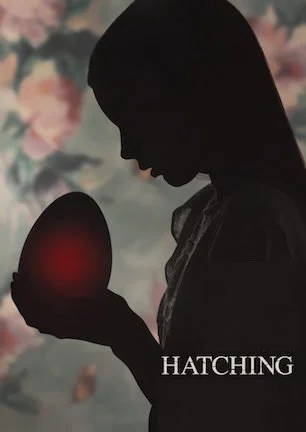Studio: IFC Midnight
Director: Hanna Bergholm
Writer: Ilja Rautsi, Hanna Bergholm
Producer: Nima Yousefi, Mika Ritalahti, Nico Ritalahti
Stars: Siiri Solalinna, Sophia Heikkila, Jani Volanen, Reino Nordin, Oiva Ollila, Ida Maattanen, Saija Lentonen
Review Score:
Summary:
In this haunting coming-of-age fable, a young girl finds a strange egg that hatches a dangerous doppelganger she tries to secretly protect.
Review:
Subtract its atypical twist and “Hatching” seemingly tells a typical coming-of-age tale. 12-year-old gymnast Tinja is approaching the turning point that often arrives when an adolescent transitions into a teenager. The girl’s Mother, given no other name and capitalized as a proper noun because she’s ubiquitous for any stage mom consumed with superficial concerns, obsessively pressures Tinja to vicariously fulfill the competitive dreams that an injured leg stole from Mother as a youth. Tinja’s Father, also given no other name and capitalized as a proper noun because he’s intended to be an indistinct identity, stays safely disconnected from Tinja due to being a nebbish with no idea how to relate to a menstruating daughter. Rude little brother Matias dresses identically to dad, yet makes it his mission to be an unprovoked bother to big sister every chance he gets. Together, the entire family composes the cast of Mother’s video blog titled “Lovely Everyday Life” which, through selective editing and verbal rehearsals, chronicles the carefree life of a happily average Finnish family.
Beneath the surface that Mother shines clean for social media promotion, things aren’t picture perfect at all. Tinja’s fellow gymnasts tease her with behind-the-back whispers. The lonely social outcast finally finds a friend in new neighbor Reetta, until Mother reminds her that Tinja’s focus should be on rigorous athletic training. Then there are the matters of dad’s daze of disinterest and Matias’s unending effort to sabotage his sister, which are minor grazes compared to the bombshell Mother explodes on her unprepared daughter. Treating Tinja like a gushy gal pal at a sleepover, Mother giddily confesses that an affair with her handyman Tero is actually true love, and she’s never been happier.
That twist mentioned earlier? Amidst all of this suburban melodrama, a bizarre incident led Tinja to discover a strange egg in a nearby forest. Instinctively drawn to the object, and somehow aware she should keep it a secret, Tinja brought the egg home and has been quietly caring for it ever since, even as it gradually grew to be almost as big as her. As though mirroring her calm nurturing, the egg came to be comforting to Tinja, and it’s what she turns to when she wants to weep about Mother’s upsetting revelation while the family falls down around her.
Tinja’s tears cause the egg to crack. Horrified at first, then curiously intrigued, what Tinja finds inside is a grotesque, birdlike creature that’s feral, yet affectionate towards Tinja. Tinja imprints on the squawking little monster, named Alli, creating a psychic bond that allows Tinja to see mortifying sights when Alli goes hunting for anyone who inflicts perceived pain on Tinja. As the bird-being gradually molts and grows hair, it becomes more humanlike in appearance. Tinja eventually recognizes she hatched a dangerous doppelganger, and balancing disparate parts of her personality while trying to keep things copacetic just became exponentially more difficult.
When “Hatching” was a festival favorite amassing buzz prior to wide release, I imagined it as a kind of throwback, weirdo body horror/creature feature with foreign flavor you would have only heard about in Fangoria back in the day. Photos highlighted the film’s wonderfully boffo puppet effects, with a cranky, creaking beastie that’s low-key cute even though it’s hideous in a magnificently monstrous way. Originating from Finland enhanced an avant-garde edge of unusualness. A horror magazine profile in the ‘80s would have hyped “Hatching” as an underground gem, and I would have hoped against hope that something so offbeat might randomly pop up on my local video shop’s shelf. In reality, those were the kinds of oddities I wouldn’t actually come across until my college years, when cult groundswells collected enough clout to pull such titles out of obscurity.
Discovering “Hatching” later in life would be to anyone’s benefit because it takes having experienced growing pain-related tumult to fully appreciate the movie’s meaning. All of the traditionally relatable touchstones feature as characters or as plot points. Sibling rivalry. Peer bullying. Realizing idolized parents are just regular, deeply flawed people. “Hatching” has the shell of a kooky horror movie, though what actually waits inside is a thoughtful allegory that illustrates eating disorders, anger issues, and marginalization as savage slashings, mutations, and an identity crisis unlike anything you might see on a CW soap opera.
More than a monster, Alli is a metaphor who operates as a physical manifestation of Tinja’s fears, frustrations, and secret desires that challenge her to do what’s right even when doing what’s wrong is so much more satisfying. Because “Hatching’s” value fluctuates according to how any particular individual sees personal experiences reflected in Tinja and Alli’s Siamese twin ordeal, no two viewings or opinions are going to be exactly alike. The movie develops too slowly for intolerant tastes and the requirement to apply your own interpretation may be too much of an arthouse touch for some. Regardless of what anyone wishes to read between the lines, “Hatching” still hits high notes of wild horror whenever Alli is unleashed, and Tinja’s plight remains endearing because hers is a sympathetically typical tale told in a highly atypical way.
NOTE: The movie’s Finnish title is “Pahanhautoja.”
Review Score: 65







What’s the point in paying the movie any attention simply because it was first to hijack a lapsed Disney property for exploitation in hacky horror?